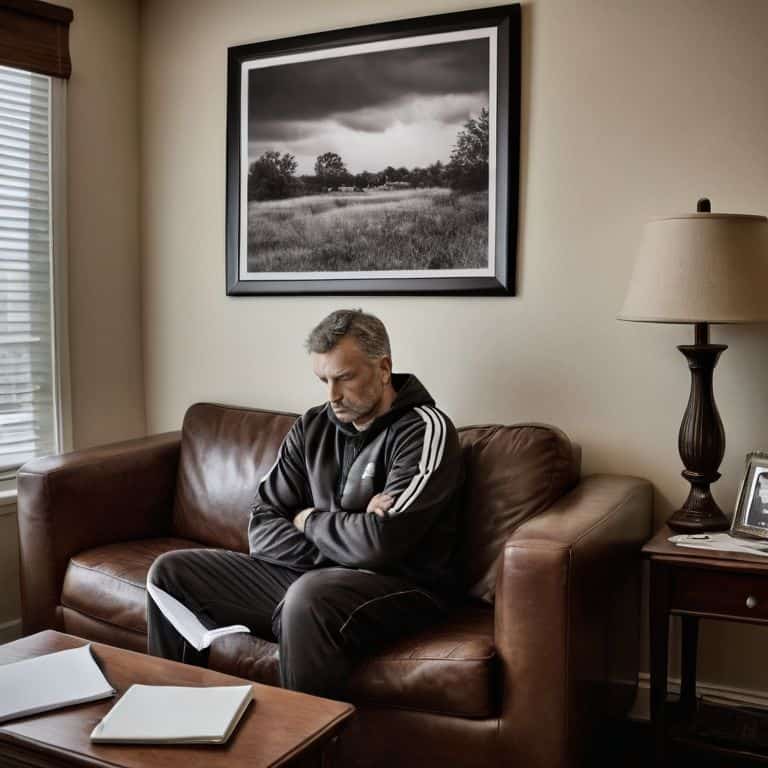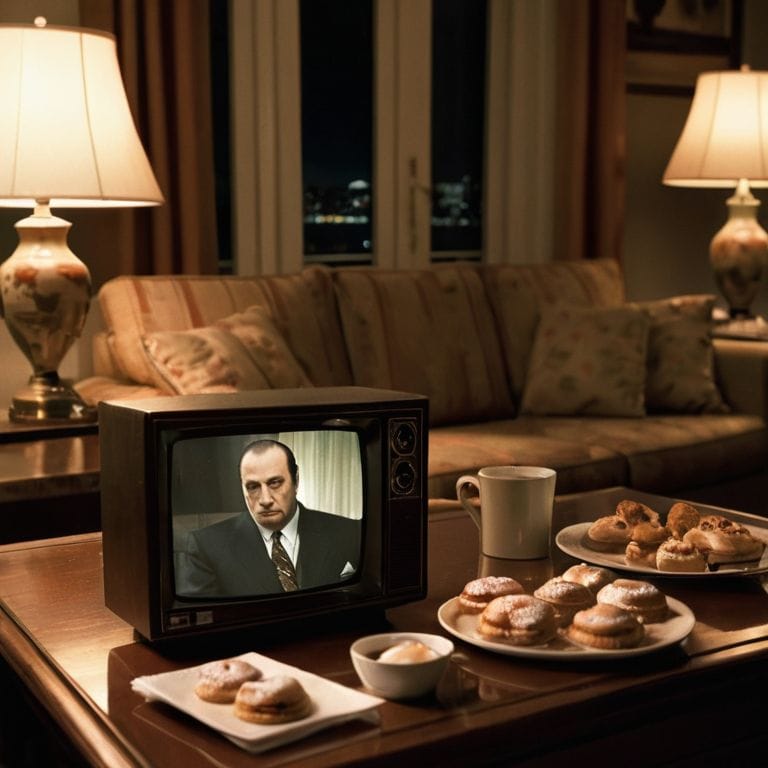I still remember the smell of cigarette smoke and freshly poured whiskey at the local bar where I first watched The Sopranos. It was the late 90s, and the show’s cultural impact was palpable, like a whispered secret among friends. Everyone was talking about Tony Soprano’s therapy sessions, and how they somehow made us all feel less alone in our own struggles. The show wasn’t just a watercooler moment; it was a cultural phenomenon that tapped into our deepest anxieties and desires. As I delved deeper into the world of media studies, I began to realize that The Sopranos was more than just a show – it was a reflection of our society’s dark underbelly.
As someone who’s spent years analyzing the cultural significance of TV shows, I’m often frustrated by the superficial discussions surrounding The Sopranos‘ influence. That’s why I want to take you on a journey to explore the unspoken truths behind the show’s enduring popularity. In this article, I promise to dive into the nitty-gritty of what made The Sopranos a cultural touchstone, and what it says about us as a society. I’ll share my own experiences, insights, and behind-the-scenes knowledge to provide a no-holds-barred look at the show’s impact on our collective psyche. So, if you’re ready to venture into the uncomfortable truths of The Sopranos‘ cultural impact, then let’s embark on this journey together.
Table of Contents
Sopranos Cultural Impact

The Sopranos’ portrayal of mental health is a fascinating aspect of its influence on modern TV. By delving into Tony Soprano’s therapy sessions, the show humanized the concept of mental illness, making it more relatable and less stigmatized. This approach has paved the way for future TV dramas to explore complex psychological themes. The show’s psychoanalytic perspectives on Tony’s character, in particular, offered a unique glimpse into the mind of a troubled individual, raising questions about the nature of identity and the human condition.
The impact of antihero characters like Tony Soprano on audiences cannot be overstated. These complex, flawed individuals have become a staple of modern television, allowing viewers to confront and understand their own dark impulses. The Sopranos’ exploration of family dynamics, particularly the tension between traditional Italian American values and modern suburban life, added depth to the show’s narrative. This blend of family drama and crime fiction has inspired a generation of TV writers to experiment with genre-bending storytelling.
The Sopranos’ effect on the golden age of TV is still being felt, with many critics citing it as a pioneering force in the development of prestige television. The show’s influence can be seen in everything from Mad Men to Breaking Bad, with its focus on complex characters, moral ambiguity, and representations of Italian American culture raising the bar for TV drama. As a cultural touchstone, The Sopranos continues to inspire new waves of writers, directors, and actors, cementing its place as one of the most significant television series of all time.
Deconstructing Tony Sopranos Psyche
As I delve into the psyche of Tony Soprano, I’m struck by the complex web of emotions that define his character. His struggles with depression, anxiety, and identity are expertly woven throughout the series, making him a deeply relatable and human figure.
In exploring Tony’s inner world, I’m drawn to the tension between loyalty and self-preservation that drives many of his decisions. This push-and-pull dynamic is a hallmark of the show’s nuanced writing, and it’s what makes Tony’s character so endlessly fascinating to dissect and analyze.
Influence on Modern Tv Antiheroes
The Sopranos paved the way for a new breed of complex, multifaceted characters, and its influence can be seen in the modern TV antiheroes that followed. Shows like Breaking Bad and Narcos feature protagonists who are morally ambiguous, walking the fine line between good and evil.
The success of these characters can be attributed to the humanization of villains, making them relatable and sympathetic, despite their questionable actions.
Legacy Beyond Jersey

As I delve into the legacy of the Sopranos, I’m struck by the show’s profound influence on modern TV. The influence of the Sopranos on modern TV can be seen in the myriad antihero characters that have followed in Tony’s footsteps. Shows like Breaking Bad and Narcos have borrowed from the Sopranos’ playbook, using complex, flawed characters to explore the human condition.
The portrayal of mental health on the Sopranos was also a game-changer, offering a nuanced and realistic depiction of anxiety and depression. This psychoanalytic perspective on Tony Soprano’s character added depth and complexity to the show, making it more than just a mob drama. By exploring the inner workings of Tony’s mind, the show’s creators were able to tap into the impact of antihero characters on audiences, creating a sense of empathy and understanding that was rare on TV at the time.
The Sopranos’ effect on the golden age of TV cannot be overstated, as it paved the way for more complex, serialized storytelling. The show’s use of family dynamics as a dramatic device also added a layer of realism and tension, making the characters feel more fully realized. By representing Italian American culture in a nuanced and multifaceted way, the Sopranos avoided stereotypes and cliches, instead offering a rich and detailed portrait of a community.
Pioneering Golden Age Storytelling
As I delve into the narrative structure of The Sopranos, I’m struck by its innovative use of non-linear storytelling, which shattered traditional TV drama conventions. This approach not only kept viewers engaged but also mirrored the chaotic, fragmented nature of Tony’s own psyche. By employing this technique, the show’s creators masterfully wove together multiple plot threads, blurring the lines between reality and fantasy.
The Sopranos’ influence on modern television is undeniable, with its complex character development raising the bar for writers and showrunners everywhere. By crafting characters with rich inner lives, the show’s creators encouraged a new era of nuanced, character-driven storytelling that continues to shape the television landscape today.
Representing Italian American Culture
The Sopranos was a show that proudly wore its Italian American heritage on its sleeve, often using cultural nuances to add depth to its characters and storylines. From the traditional Sunday dinners to the reverence for Italian folklore, the series presented a complex and multifaceted portrayal of Italian American life.
In doing so, the show helped to humanize stereotypes, presenting characters that were flawed and relatable, rather than relying on tired tropes or caricatures. This thoughtful representation not only resonated with Italian American audiences but also helped to foster a greater understanding and appreciation of the culture among viewers from other backgrounds.
Unpacking the Sopranos' Enduring Influence: 5 Key Takeaways
- Beyond the Bada Bing: Recognize how The Sopranos humanized the antihero, making them relatable and complex, thus changing the face of television characters
- Suburban Anxiety and the American Dream: Understand how the show critiqued suburban life, revealing the emptiness and disillusionment beneath the surface of middle-class America
- From Jersey to the World: Identify the global impact of The Sopranos, including its influence on international television productions and the creation of new antiheroes in various cultural contexts
- The Power of Therapy: Analyze how The Sopranos used Tony’s therapy sessions as a narrative device to explore themes of identity, loyalty, and the psychological effects of violence
- Timeless Storytelling: Appreciate how the show’s blend of family drama, crime saga, and dark humor continues to influence contemporary storytelling, from TV series to films, and its ability to tap into universal anxieties and desires
Key Takeaways: Unpacking The Sopranos' Lasting Influence
I’ve come to realize that The Sopranos’ profound impact on popular culture stems from its bold deconstruction of the American Dream, revealing the dark underbelly of suburban life and the existential crises of its iconic antihero, Tony Soprano
The show’s influence can be seen in the proliferation of complex, morally ambiguous characters in modern television, a testament to the pioneering work of David Chase and his team in redefining the boundaries of serial storytelling
Beyond its influence on the television medium, The Sopranos has left an indelible mark on our collective cultural psyche, offering a nuanced exploration of identity, community, and the human condition that continues to resonate with audiences today
Unpacking the Soprano Effect
The Sopranos didn’t just reflect our societal anxieties, it refracted them, bending the harsh light of our collective psyche into a kaleidoscope of flawed characters, moral ambiguities, and the desperate search for identity in a postmodern world.
Julian Thorne
The Enduring Reverberations of The Sopranos

As I reflect on the cultural impact of The Sopranos, it’s clear that this show was more than just a television series – it was a cultural phenomenon that tapped into our collective psyche. From deconstructing Tony Soprano’s complex psyche to influencing the modern TV antihero, The Sopranos has left an indelible mark on our popular culture. Its representation of Italian American culture and pioneering storytelling have paved the way for future generations of writers and creators. The show’s influence can be seen in many aspects of our society, from the way we think about mental health to the way we consume television.
So as we continue to navigate the ever-changing landscape of modern television, let’s not forget the profound impact that The Sopranos has had on our culture. It’s a reminder that even the most seemingly mundane artifacts can hold deep insights into our society, and that by examining them closely, we can gain a better understanding of ourselves and the world around us. The Sopranos may have ended its run, but its influence will continue to be felt for years to come, inspiring new generations of creators and audiences alike to explore the complexities of the human experience.
Frequently Asked Questions
How did The Sopranos' portrayal of mental health, specifically Tony's therapy sessions, influence the way mental illness is depicted in modern television?
Tony’s therapy sessions humanized mental illness, making it relatable and accessible. This portrayal paved the way for modern TV’s nuanced exploration of mental health, as seen in shows like Fleabag and BoJack Horseman, where characters’ inner struggles are laid bare with unflinching honesty.
In what ways did The Sopranos' deconstruction of the American Dream reflect or shape the cultural attitudes towards suburban life and the notion of 'success'?
The Sopranos masterfully subverted the idyllic suburban facade, revealing the emptiness and disillusionment beneath. Tony’s struggles with identity, family, and materialism exposed the cracks in the American Dream, resonating with audiences and influencing cultural attitudes towards success as a flawed, unattainable ideal.
Can the impact of The Sopranos on popular culture be measured by its influence on other antihero-centric shows, and if so, what does this say about our collective fascination with flawed, often brutal, protagonists?
The Sopranos’ influence on antihero-centric shows is undeniable, but what’s fascinating is how it reveals our collective fascination with the darker aspects of human nature, begging the question: are we drawn to these flawed characters because they mirror our own anxieties and desires, or do they serve as a safe outlet for our own repressed impulses?
